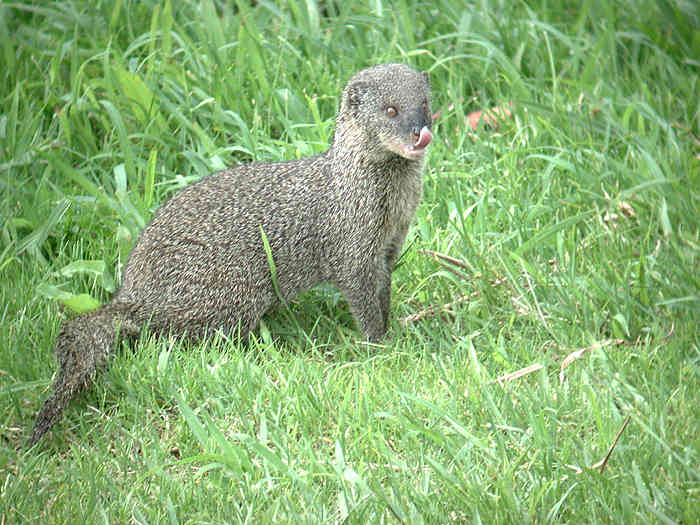|
| 질의: Forest frog | 결과: 148번째/187 | |
Small Asian Mongoose (Herpestes javanicus) - Wiki
| 제목: | Small Asian Mongoose (Herpestes javanicus) - Wiki
| |

| 해상도: 700x525
파일크기: 60777 Bytes
등록시간: 2007:08:14 13:31:59
|
ERROR : Server Busy(-1105)
ERROR : Server Busy(-1105)
Small Asian Mongoose (Herpestes javanicus) - Wiki
Small Asian Mongoose
From Wikipedia, the free encyclopedia
[Photo] Herpestes javanicus. Date 2006. Author Alessio Marrucci
The Small Asian Mongoose (Herpestes javanicus), also known as the Indian Mongoose, Small Indian Mongoose, or the Javan Mongoose, is a species of mongoose found in the wild in South and Southeast Asia. It has also been introduced to various parts of the world.
Distribution and habitat
This species occurs naturally throughout most of southern mainland Asia, from Iraq to China, as well as on the island of Java, at altitudes up to 2200 m. It has also been introduced to dozens of islands in the Pacific and Caribbean, and a few in the Indian Ocean and Mediterranean, as well as to mainland Venezuela. It is capable of living among fairly dense human populations.
Mongooses lives in scrublands and dry forest. On Pacific Islands they live in rainforests as well.
Diet
These mongooses mostly eat insects but are opportunistic feeders and will eat crabs, frogs, spiders, scorpions, snakes, and birds.
Behavior and reproduction
Mongooses are mostly solitary altough males will sometimes form social groups and share burrows. Pregnancy duration is up to 49 days. A litter can consist of 2-5 young.
Introduction to Hawaii
The 1800s were a huge century for sugar cane, and plantations shot up on many tropical islands including Hawai'i and Jamaica. With sugar cane came rats, attracted to the sweet plant, which ended up causing crop destruction and loss. In 1872, W.B. Espeut, in an attempt to control the rising rat populations, brought the Small Asian Mongoose from Calcutta to Jamaica. A paper published by Espeut that praised the results intrigued Hawaiian plantation owners who, in 1883, brought 72 mongooses from Jamaica to the Hamakua Coast on the Big Island. These were raised and their offspring were shipped to plantations on other islands.
Only the islands of Lana'i and Kaua'i are (thought to be) free of mongooses. There are two conflicting stories of why Kaua'i was spared. The first is that the residents of Kaua'i were opposed to having the animals on the island and when the ship carrying the offspring reached Kaua'i, the animals were thrown overboard and drowned. A second story tells that on arriving on Kaua'i one of the mongooses bit a dockworker who, in a fit of anger, threw the caged animals into the harbor to drown.
Invasive species
The mongoose introduction did not have the desired effect of rat control. The mongoose hunted birds and bird eggs threatening many local island species. The mongooses bred prolifically with males becoming sexually mature at 4 months and females producing litters of 2-5 pups a year.
Mongooses can also carry leptospirosis and these can contaminate water supplies.
http://en.wikipedia.org/wiki/Small_Asian_Mongoose
| The text in this page is based on the copyrighted Wikipedia article shown in above URL. It is used under the GNU Free Documentation License. You may redistribute it, verbatim or modified, providing that you comply with the terms of the GFDL. |
^o^
동물그림창고 똑똑전화 누리집
^o^
|
|
|